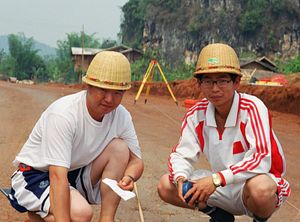China has been a socioeconomic and political success since Chinese economic reforms began in the late 1970s. This success results from the combination of its hard-working and disciplined people, and robust Communist Party of China (CPC) leadership that has been willing to reinvent itself by learning from its own the mistakes and successes, as well as those of other countries. In the last decade, the CPC has been carefully assessing foreign economic, political, technological and social approaches and innovations, and skillfully adapting them to China’s unique context and needs; i.e. modify them to have Chinese characteristics.
As most countries, China wants to “strengthen its position and prestige in the international arena, as well as to create favorable conditions for its long-term socio-economic development,” for which it uses hard and soft power strategies, the latter being described by Professor Joseph Nye as “getting others to want what you want.” China’s growing global strategy has been marked by Beijing’s political, military and economic non-interference, and respectful relations with other governments. This is particularly the case when it comes to bilateral relations with governments from developing countries that depend on Beijing to build their infrastructure as, in turn, China depends on them for their natural resources and markets. And while China is becoming increasingly assertive and willing to use its growing hard power on issues such as its territorial integrity and role in the international financial markets, Beijing is investing massive human and financial resources to develop its soft power.
Beijing is making significant efforts to expand its soft power, for example, by building constructive relations with governments, promoting Chinese culture across its hundreds of Confucius Institutes around the globe and facilitating necessary financing and know-how for large infrastructure projects in the developing world. While Beijing’s efforts have contributed to improving China’s image, state sponsored initiatives, foreign policies and diplomacy alone are not enough to grow the country’s soft power. Generating soft power also depends on numerous non-state actors, such as entertainment and news outlets, consumer brands, NGOs, and, particularly in China’s case, people-to-people relations internationally.
Interpersonal relations between Chinese citizens in foreign countries and the local populations are increasingly fundamental to generate and preserve China’s soft power, owing to the large number of Chinese projects and businesses using Chinese labor in developing countries. When western countries establish projects in developing countries, they only send a few of their own citizens to the host country, mostly employed in managerial positions, resulting in very limited interactions with the local citizens. Unlike western countries, China sends large numbers of blue-collar workers to host countries (a contentious issue in itself), who interact extensively with the local population, both on and off the construction sites where they work.
As a result, Chinese white-collar and blue-collar workers become China’s unwitting sociocultural ambassadors and play a fundamental role in building or—more importantly—potentially undermining China’s soft power. So far, it seems that Beijing has underestimated the crucial role that interpersonal relations between its citizens and the local populations play in building and maintaining China’s image and influence. Arguably, poor interpersonal relations are undermining China’s efforts, resulting in host country populations viewing China and the Chinese with dislike, suspicion and even fear.
This is the case in numerous developing countries, primarily in Central and Southeast Asia, as well as in Africa. In a previous article “Could Han Chauvinism Turn the ‘Chinese Dream’ into a ‘Chinese Nightmare’?,” I discussed the increasing interpersonal tensions and disputes between Chinese businessmen and the local populations in Central Asian countries that resulted from ignoring local traditions and values. As a result, Kazakhs, Kyrgyz and Tajiks feel anxious about the increasing Chinese presence and influence in their respective countries.
China is also “carelessly losing its soft power battle” in the cases of Indonesia and Angola because of poor interpersonal relations, resulting in locals feeling discriminated against when Chinese undertake large development projects and conduct business. Specifically, both Angolans and Indonesians feel that Chinese management and workers do not respect local cultures and values, and that they are hired predominately for unskilled labor, paid much lower wages than Chinese workers doing the same work and do not receive benefits that Chinese workers get, such as high-quality meals, insurance or even a work contract. The outcome: local populations increasingly adopt a negative image of Chinese companies and China, despite China’s significant contributions to help these nations develop their economy, technology and infrastructure.
While Beijing has successfully established robust relations with governments in developing countries, it has, however, failed to guide its citizens in building respectful and constructive interpersonal relations. This has resulted in host communities becoming increasingly anxious about China’s intentions to the point that there have been numerous violent attacks against Chinese citizens and property. Recent cases include the bombing of the Chinese embassy in Kyrgyzstan and the killing of two Chinese citizens in Pakistan.
To prevent poor interpersonal relations from being the Achilles’ heel of an otherwise robust projection of Chinese soft power in developing countries, the CPC must make a concerted effort to equip Chinese citizens with the necessary sociocultural tools to build respectful and long-term people-to-people relations. This could be achieved, for example, by providing basic cultural and language training to workers/executives based in target countries, underlining respect of local traditions. This training should emphasize that each Chinese individual working abroad is, in fact, a de facto ambassador of China and must safeguard China’s interests in the region. Additionally, to avoid repeating the same mistakes, it is necessary to encourage site managers to record and report disputes.
Better interpersonal relations between Chinese citizens and local populations in developing nations, including an appreciation for local customs and expectations can prove reciprocal, and create a critical synergy that is fundamental for China’s long-term positive standing in the world.
Patrik K. Meyer holds a Ph.D. in International Studies from the University of Cambridge and currently a Visiting Professor at Universitas Muhammadiyah Yogyakarta and a New America Security Fellow.

































